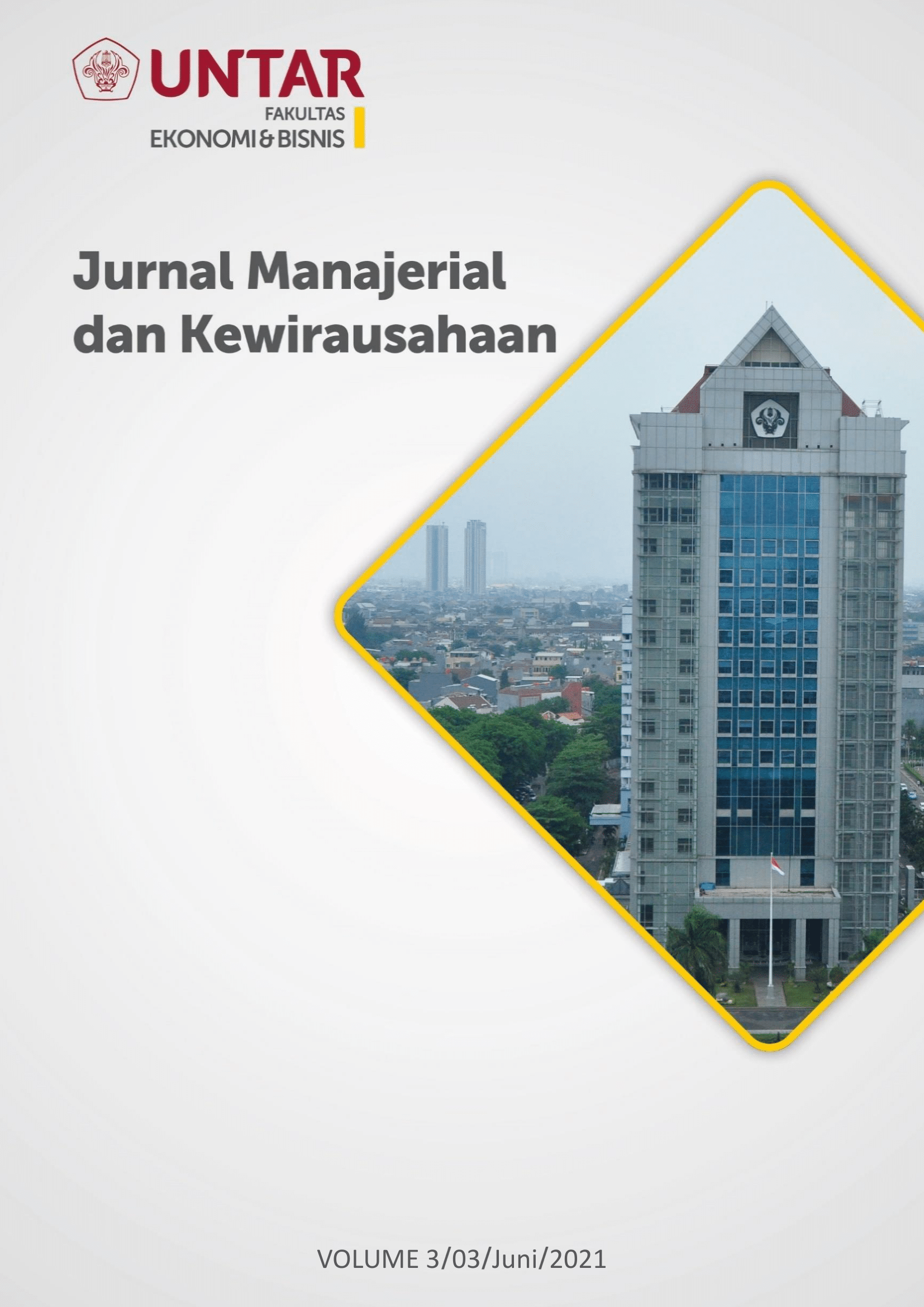Pengaruh Pendidikan Kewirausahaan, Efikasi Diri, Kepribadian Dan Peran Faktor Keluarga Terhadap Niat Berwirausaha
Main Article Content
Abstract
The purpose of this study was to examine the effect of entrepreneurship education, self-efficacy, personality and the role of family factors on entrepreneurial intentions. The data collection technique used a questionnaire distributed online through social media in the form of Whatsapp, Line and Instagram. The number of samples used in this study were 100 respondents who were students of Universitas Tarumanagara. The sample selection technique in this study was purposive sampling. The data analysis technique used the PLS-SEM method. The results showed that entrepreneurship education, self-efficacy, personality and the role of family factors had a positive and significant effect on entrepreneurial intentions.
Tujuan dari penelitian ini untuk menguji pengaruh antara pendidikan kewirausahaan, efikasi diri, kepribadian dan peran faktor keluarga terhadap niat berwirausaha. Teknik pengumpulan data menggunakan kuesioner yang disebarkan secara online melalui media sosial berupa Whatsapp, Line dan Instagram. Jumlah sampel yang digunakan dalam penelitian ini sebanyak 100 responden yang merupakan mahasiswa/i Universitas Tarumanagara. Teknik pemilihan sampel pada penelitian ini adalah purposive sampling. Teknik analisis data menggunakan metode PLS-SEM. Hasil penelitian menunjukkan pendidikan kewirausahaan, efikasi diri, kepribadian dan peran faktor keluarga berpengaruh positif dan signifikan terhadap niat berwirausaha.
Article Details
This work is licensed under a Jurnal Muara Ilmu Ekonomi dan Bisnis Creative Commons Attribution-ShareAlike 4.0 International License.,/p>
References
Ajzen, I. (1985). From intentions to actions: A theory of planned behavior. In Action control, 11-39.
Berlin: Springer. , (2005). Attitudes, personality, and behavior. United Kingdom: McGraw-Hill Education.
Alma, B. (2013). Kewirausahaan Untuk Mahasiswa dan Umum. Bandung: Alfabeta.
Aritonang R., L. R. (2007). Riset Pemasaran: Teori & Praktik. Bogor: Penerbit Ghalia Indonesia.
Bandura, A. (1977). Self-efficacy: toward a unifying theory of behavioral change. Psychological review, 84(2), 191.
Badan Pusat Statistik. (2020). Tingkat Pengangguran Terbuka Berdasarkan Kelompok Umur, 2020 (Retrieved from: www.bps.go.id/5-11-2020)
Blegur, A., & Handoyo, S. E. (2020). Pengaruh Pendidikan Kewirausahaan, Efikasi Diri dan Locus of Control Terhadap Intensi Berwirausaha. Jurnal Manajerial dan Kewirausahaan, 2(1), 51-61.
Boz, A., & Ergeneli, A. (2014). “Women entrepreneur personality characteristics and parents parenting style profile in Turkey”. Procedia-social and behavioral sciences, 109, 92- 97. DOI: https://doi.org/10.1016/j.sbspro.2013.12.425
Farrukh, M., Khan, A. A., Khan, M. S., Ramzani, S. R., & Soladoye, B. S. A. (2017). “Entrepreneurial intentions: the role of family factors, personality traits and selfefficacy”. World Journal of Entrepreneurship, Management and Sustainable Development, 13(4).
Ginting, M., & Yuliawan, E. (2015). Jurnal Analisis faktor-faktor yang mempengaruhi minat berwirausaha mahasiswa. Studi kasus pada stmik mikroskil Medan. 5(1), 61-68. DOI: https://doi.org/10.1111/j.1540-6520.2005.00099.x
Isabella, T. (2010). Theory planned of behaviour sebagai variabel anteseden faktor-faktor yang mempengaruhi intensi berwirausaha. Studi pada mahasiswa fakultas ekonomi manajemen. Universitas Sebelas Maret, Jawa Tengah.
Jonathan, S., & Herlina, B. (2012). Statistik Terapan: Aplikasi Untuk Riset Skripsi, Tesis dan Disertasi (Menggunakan SPSS, AMOS, dan Excel). Jakarta: PT Elex Media Komputindo, Gramedia.
Karabulut, A. T. (2016). Personality traits on entrepreneurial intention. Procedia-Social and Behavioral Sciences, 229, 16-21. DOI: https://doi.org/10.1016/j.sbspro.2016.07.109.
Kuratko, D. F. (2005). The emergence of entrepreneurship education: Development, Trends, and Challenges. Entrepreneurship theory and practice, 29(5), 577-597.
Lestari, Retno Budi dan Trisnadi Wijaya. (2012). Pengaruh Pendidikan Kewirausahaan Terhadap Minat Berwirausaha Mahasiswa di STIE MDP, STMIK MDP, dan STIE MUSI. Jurnal Ilmiah Bisnis dan Kewirausahaan STIE MDP, 1(2), 112-119.
Notoatmodjo, S. (2012). Metodologi penelitian kesehatan. Jakarta: PT. Rineka Cipta.
Nurchotim Lukman Hidayatullah. (2012). “Minat Berwirausaha Program Studi S1 Pendidikan Teknik Elektro Jurusan Teknik Elektri Fakultas Teknik Universitas Negeri Semarang”. Skripsi. Universitas Negeri Semarang, Jawa Tengah.
Rauch, A., & Frese, M. (2007). Let's put the person back into entrepreneurship research: A meta-analysis on the relationship between business owners' personality traits, business creation, and success. European Journal of work and organizational psychology, 16(4), 353-385. DOI: https://doi.org/10.1080/13594320701595438
Yamin, S., & Kurniawan, H. (2009). SPSS Complete: Teknik Analisis Statistik Terlengkap dengan Software SPSS. Jakarta: Salemba Infotek.
Zhao, H., Seibert, S.K. & Hills, G.E. (2005). The mediating role of self-efficacy in the development of entrepreneurial intentions. Journal of Applied Psychology, 90(6), 1265- 1272. DOI: https://doi.org/10.1037/0021-9010.90.6.1265



